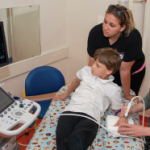For More Information
- To learn more about or apply to RhMSUS, visit www.rheumatology.org/RhMSUS or contact [email protected].
- For information or to register for one of our MSUS educational courses, visit www.rheumatology.org/education or contact [email protected].
- For billing and coding assistance, visit http://www.rheumatology.org/Practice/Office/Coding/Coding/ or contact Melesia Tillman, CPC, CPC-I, CRHC, CHA, at (404) 633-3777 or [email protected].

Many members have asked what our “grand plan” might be for the coming year. My answer is easy: The ACR’s 2013–2016 strategic plan will guide our work in the year that I serve as president and for the next two years as well. From time to time, I will report in this column about our progress in achieving the ACR’s strategic goals.
I would like to focus this month on how the ACR’s Musculoskeletal Ultrasound Certification in Rheumatology program (RhMSUS) aids in the overall goal of developing tools to address evolving payment reforms, increase practice efficiency, and improve quality of care.
Musculoskeletal ultrasound (MSUS) is a modality that has been shown to have many potential benefits for diagnosing and treating patients with rheumatic conditions. RhMSUS supports physicians and health professionals by demonstrating their expertise in using this tool.
How RhMSUS Came About
MSUS has been part of an imaging revolution in rheumatology. Over the past several years, it has been more widely adopted by rheumatologists and health professionals in their care of patients in the U.S., even though it has been used in other parts of the world for many years. Studies have shown the potential benefits of MSUS include faster and more accurate diagnoses, optimized treatment, and improved needle placement accuracy. However, the integration of MSUS into rheumatology practice has also raised questions regarding training, education, reimbursement, utilization, competence, certification, and accreditation.
As part of the ACR’s commitment to Advance Rheumatology!, we gathered experts to examine these questions and provide recommendations regarding the ACR’s role in MSUS. I participated in this exploration as the board liaison to the ACR’s Musculoskeletal Ultrasound Certification Task Force from 2010–2011. I can tell you firsthand that the process of determining whether the RhMSUS program was necessary was not a short or easy one, but a labor of extreme care, consideration, and importance to the ACR.
The ACR’s exploration of certification began in 2010 with the release of the American Institute of Ultrasound in Medicine (AIUM) Training Guidelines for the Performance of Musculoskeletal Ultrasound Examinations. Along with the training guidelines, AIUM developed an accreditation program for MSUS. However, AIUM only accredits the practice or institution, not the individual practitioner, and the program is intended for MSUS in general, rather than its application in rheumatology.
